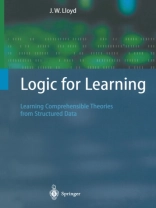This book is concerned with the rich and fruitful interplay between the fields of computational logic and machine learning. The intended audience is senior undergraduates, graduate students, and researchers in either of those fields. For those in computational logic, no previous knowledge of machine learning is assumed and, for those in machine learning, no previous knowledge of computational logic is assumed. The logic used throughout the book is a higher-order one. Higher-order logic is already heavily used in some parts of computer science, for example, theoretical computer science, functional programming, and hardware verifica- tion, mainly because of its great expressive power. Similar motivations apply here as well: higher-order functions can have other functions as arguments and this capability can be exploited to provide abstractions for knowledge representation, methods for constructing predicates, and a foundation for logic-based computation. The book should be of interest to researchers in machine learning, espe- cially those who study learning methods for structured data. Machine learn- ing applications are becoming increasingly concerned with applications for which the individuals that are the subject of learning have complex struc- ture. Typical applications include text learning for the World Wide Web and bioinformatics. Traditional methods for such applications usually involve the extraction of features to reduce the problem to one of attribute-value learning.
John W. Lloyd
Logic for Learning [PDF ebook]
Learning Comprehensible Theories from Structured Data
Logic for Learning [PDF ebook]
Learning Comprehensible Theories from Structured Data
Kup ten ebook, a 1 kolejny otrzymasz GRATIS!
Język Angielski ● Format PDF ● ISBN 9783662084069 ● Wydawca Springer Berlin Heidelberg ● Opublikowany 2013 ● Do pobrania 3 czasy ● Waluta EUR ● ID 6343067 ● Ochrona przed kopiowaniem Adobe DRM
Wymaga czytnika ebooków obsługującego DRM












